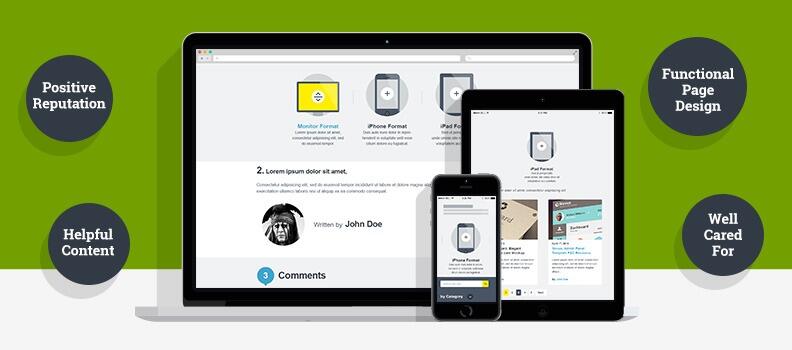
What makes a page high quality? A look at Google's quality guidelines
Google not only uses it's algorithm to identify if a page is worthy of a top ranking on its search results. It also uses human quality raters to assess whether or not a web page has the characteristics of a low or high quality web page. We recently looked at what makes a web page low quality. In this article we'll take a look at the characteristics of high quality web pages. The full 160 page PDF of Google's Search Quality Rating Guidelines is available to download.
- Characteristics of High Quality Pages Not surprisingly a High quality web page should be satisfying and achieve its purpose well. It should have at lease one of the following characteristics. • A satisfying amount of high quality Main Content. • The page and website are expert, authoritative, and trustworthy for the topic of the page. • The website has a good reputation for the topic of the page. Reputation is provided by the feedback by users on that page or the quality of links referring back to the page. In addition, the web page should have most of the following: • A satisfying amount of website information, for example, About Us information, Contact or Customer Service information, etc. • Supplementary Content which contributes to a satisfying user experience on the page and website. • Functional page design which allows users to easily focus on Main Content and use Supplementary Content as desired. • A website which is well cared for and maintained.Let's look at these in more detail.
- A Satisfying Amount of High Quality Main Content The quality of the Main Content is one of the most important considerations in Page Quality rating. For all types of webpages, creating high quality Main Content takes a significant amount of at least one of the following: time, effort, expertise, and talent/skill. The purpose of the page should help you determine what high quality content means for that page. For example, High quality encyclopedia articles should be factual, accurate, clearly written, and comprehensive. High quality shopping content should allow you to find the products you want and to purchase the products easily. High quality humor content should be entertaining. The amount of content necessary for the page to be satisfying depends on the topic and purpose of the page. A High quality page on a broad topic with a lot of available information will have more content than a High quality page on a more narrow topic.
- A High Level of Expertise/Authoritativeness/Trustworthiness (E-A-T) High quality pages and websites need enough expertise to be authoritative and trustworthy on their topic. Keep in mind that there are “expert” websites of all types, even gossip websites, fashion websites, humor websites, forum and Q&A pages, etc. In fact, some types of information are found almost exclusively on forums and discussions, where a community of experts can provide valuable perspectives on specific topics.
- Positive Reputation Reputation is an important consideration when using the High rating. While a page can merit the High rating with no reputation, the High rating cannot be used for any website that has a convincing negative reputation. A very positive reputation can be a reason for using the High rating for an otherwise Medium page.
- Helpful Supplementary Content Supplementary Content can be a large part of what makes a High quality page very satisfying for its purpose. Features designed to help shoppers find other products they might also like can be as helpful as the Main Content on the page. Ways to find other cool stuff on entertainment websites can keep users browsing happily. Helpful Supplementary Content on a recipe webpage can make the difference between whether the recipe is a success or a failure.
- Functional Page Design High quality pages are designed to achieve their purpose: they are well organised, use space effectively, and have a functional overall layout. While every page is different, functional pages should have the following characteristics: • The Main Content should be prominently displayed “front and center.” • The Main Content should be immediately visible when a user opens the page. • It should be clear what the Main Content actually is. The page design, organisation, and use of space, as well as the choice of font, font size, background, etc., should make the Main Content very clear. • Ads and Supplementary Content should be arranged so as not to distract from the Main Content—Ads and Supplementary Content are there should the user want them, but they should be easily “ignorable” if the user is not interested. • It should be clear what parts of the page are Ads, either by explicit labeling or simply by page organisation or design.
- A Satisfying Amount of Website Information Websites frequently include the following information: • About Us information. • Contact or Customer Service information. • Information about who is responsible for the content and maintenance of the website. Think about the purpose of the website and the type of content that might be available when considering what website information would be expected or demanded. High quality websites provide clear and satisfying information for their purpose.
- A Well Cared For and Maintained Website High quality large news websites are frequently updated, often adding news articles many times a day. High quality medical advice websites keep all of their informational pages current. Other websites, such as websites for small businesses, may be updated less frequently since addresses and store hours rarely change.How frequently a website should be updated depends on its purpose. However, all High quality websites are well cared for, maintained, and updated appropriately.


